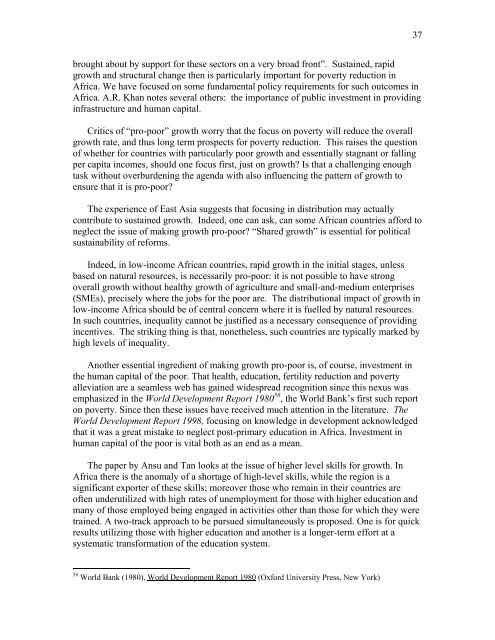Paper - Initiative for Policy Dialogue
Paper - Initiative for Policy Dialogue
Paper - Initiative for Policy Dialogue
Create successful ePaper yourself
Turn your PDF publications into a flip-book with our unique Google optimized e-Paper software.
37<br />
brought about by support <strong>for</strong> these sectors on a very broad front”. Sustained, rapid<br />
growth and structural change then is particularly important <strong>for</strong> poverty reduction in<br />
Africa. We have focused on some fundamental policy requirements <strong>for</strong> such outcomes in<br />
Africa. A.R. Khan notes several others: the importance of public investment in providing<br />
infrastructure and human capital.<br />
Critics of “pro-poor” growth worry that the focus on poverty will reduce the overall<br />
growth rate, and thus long term prospects <strong>for</strong> poverty reduction. This raises the question<br />
of whether <strong>for</strong> countries with particularly poor growth and essentially stagnant or falling<br />
per capita incomes, should one focus first, just on growth Is that a challenging enough<br />
task without overburdening the agenda with also influencing the pattern of growth to<br />
ensure that it is pro-poor<br />
The experience of East Asia suggests that focusing in distribution may actually<br />
contribute to sustained growth. Indeed, one can ask, can some African countries af<strong>for</strong>d to<br />
neglect the issue of making growth pro-poor “Shared growth” is essential <strong>for</strong> political<br />
sustainability of re<strong>for</strong>ms.<br />
Indeed, in low-income African countries, rapid growth in the initial stages, unless<br />
based on natural resources, is necessarily pro-poor: it is not possible to have strong<br />
overall growth without healthy growth of agriculture and small-and-medium enterprises<br />
(SMEs), precisely where the jobs <strong>for</strong> the poor are. The distributional impact of growth in<br />
low-income Africa should be of central concern where it is fuelled by natural resources.<br />
In such countries, inequality cannot be justified as a necessary consequence of providing<br />
incentives. The striking thing is that, nonetheless, such countries are typically marked by<br />
high levels of inequality.<br />
Another essential ingredient of making growth pro-poor is, of course, investment in<br />
the human capital of the poor. That health, education, fertility reduction and poverty<br />
alleviation are a seamless web has gained widespread recognition since this nexus was<br />
emphasized in the World Development Report 1980 58 , the World Bank’s first such report<br />
on poverty. Since then these issues have received much attention in the literature. The<br />
World Development Report 1998, focusing on knowledge in development acknowledged<br />
that it was a great mistake to neglect post-primary education in Africa. Investment in<br />
human capital of the poor is vital both as an end as a mean.<br />
The paper by Ansu and Tan looks at the issue of higher level skills <strong>for</strong> growth. In<br />
Africa there is the anomaly of a shortage of high-level skills, while the region is a<br />
significant exporter of these skills; moreover those who remain in their countries are<br />
often underutilized with high rates of unemployment <strong>for</strong> those with higher education and<br />
many of those employed being engaged in activities other than those <strong>for</strong> which they were<br />
trained. A two-track approach to be pursued simultaneously is proposed. One is <strong>for</strong> quick<br />
results utilizing those with higher education and another is a longer-term ef<strong>for</strong>t at a<br />
systematic trans<strong>for</strong>mation of the education system.<br />
58 World Bank (1980), World Development Report 1980 (Ox<strong>for</strong>d University Press, New York)














